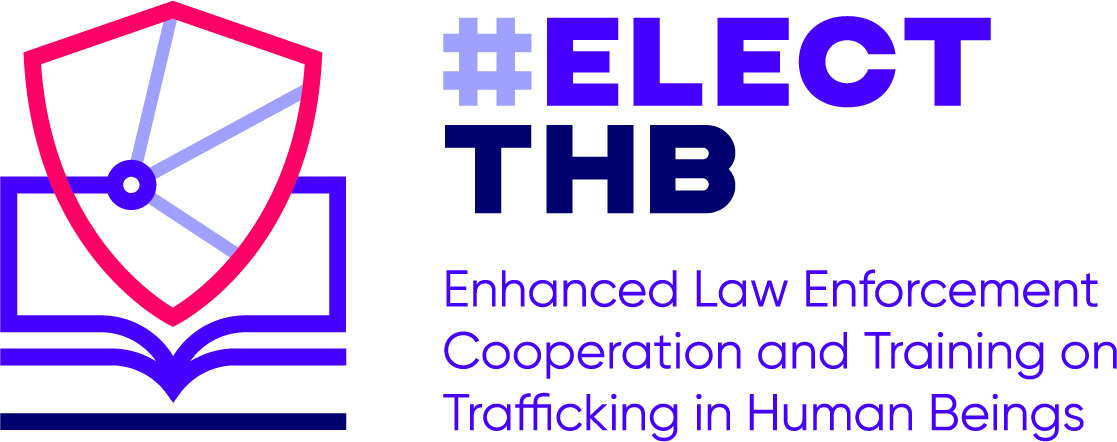
ELECT THB
Knowledge base
Streamline your investigations with ELECT THB Knowledge base: your all-in-one resource for trafficking materials.
STRUCTURE
The ELECT THB project aims to enhance the identification and investigation of trafficking in human beings (THB) for sexual and labour exploitation and increase collaboration between law enforcement authorities and other key actors to combat it.
The project has been developed in close cooperation with law enforcement and other authorities in Finland, Estonia and Latvia to strengthen the knowledge of and approach to human trafficking. Human trafficking and the wider shadow economy and financial crime are also closely linked. Therefore, the project aims to disrupt the financial business model of trafficking which will help counter the impunity of traffickers, exploiters, profit makers, users and abusers and untangle the trafficking chain.
The project has been developed in close cooperation with law enforcement and other authorities in Finland, Estonia and Latvia to strengthen the knowledge of and approach to human trafficking. Human trafficking and the wider shadow economy and financial crime are also closely linked. Therefore, the project aims to disrupt the financial business model of trafficking which will help counter the impunity of traffickers, exploiters, profit makers, users and abusers and untangle the trafficking chain.
ELECT THB Project Introduction
This project was funded by the European Union's Internal Security Fund — Police.
The content of the project materials represent the views of the authors only and is their sole responsibility. The European Commission does not accept any responsibility for use that may be made of the information it contains.
The content of the project materials represent the views of the authors only and is their sole responsibility. The European Commission does not accept any responsibility for use that may be made of the information it contains.
1
Latest trends and statistics
Trafficking remains a hidden crime but the detection of trafficking cases is increasing.
Most offences are not reported to the authorities and therefore go undetected. In many countries, there is no comprehensive statistical data available on human trafficking. Different authorities and NGOs working in the field collect their own data.
Eurostat (2023) statistics on registered victims of trafficking, classified by the form of exploitation, show that sexual exploitation is still the most commonly identified form of exploitation in the EU (55.7% of cases). Forced labour or services comprised 28.5% of all registered victims. The share of victims exploited for other purposes (including benefit fraud, criminal activities, begging and trade in organs) was 15.8% in 2021.
Eurostat (2023) statistics on registered victims of trafficking, classified by the form of exploitation, show that sexual exploitation is still the most commonly identified form of exploitation in the EU (55.7% of cases). Forced labour or services comprised 28.5% of all registered victims. The share of victims exploited for other purposes (including benefit fraud, criminal activities, begging and trade in organs) was 15.8% in 2021.
Useful sources for statistics on human trafficking
The Counter Trafficking Data Collaborative (CTDC): global data hub on human trafficking
Eurostat
GRETA – the Group of Experts on Action against Trafficking in Human Beings
UNODC - Human Trafficking and Migrant Smuggling Section
US Trafficking in Persons Report
Ihmiskauppa.fi - focal website in bringing together information about human trafficking and anti-trafficking activities in Finland
Eurostat
GRETA – the Group of Experts on Action against Trafficking in Human Beings
UNODC - Human Trafficking and Migrant Smuggling Section
US Trafficking in Persons Report
Ihmiskauppa.fi - focal website in bringing together information about human trafficking and anti-trafficking activities in Finland
2
Modus operandi of trafficking crimes: current themes
Learn more on the modus operandi and different schemes used by traffickers to exploit people and hide their illicit activities and evade taxes and social contributions in order to maximize their profits.
Modus operandi: Human Trafficking for Labour Exploitation by Anniina Jokinen, HEUNI
Modus operandi: Human Trafficking for Sexual Exploitation by Anniina Jokinen, HEUNI
Abusive recruitment is one of the key risk factors for labour exploitation and trafficking. This includes collecting excessive or made-up fees for securing the job, for travel documents and "service costs" etc. As a result, the worker may become indebted and more vulnerable to further exploitation.
A common tactic used by traffickers to exploit vulnerable workers by posting them to work in a different country or region, where they may face precarious employment conditions, inadequate pay, and lack of social protection.
Forced bogus self-employment refers to a situation where the conditions of work resemble an employment relationship but the worker is self-employed on paper and responsible for the risks and obligations related to self-employment, while the employer is able to cut costs. These types of arrangements have become more common of late in the context of labour exploitation also in Finland, Estonia and Latvia.
Traffickers frequently target marginalized communities, such as migrants, women, children, and individuals living in poverty, to exploit them for labor or sexual exploitation.
Methods utilized by human traffickers in the realm of sexual exploitation.
The policy brief below summarises the main findings of the report "Patterns of exploitation – human trafficking trends and modus operandi in Finland, Latvia, Estonia, Poland and Ukraine" edited by Anna-Greta Pekkarinen and Anniina Jokinen.
3
INVESTIGATIVE INTERVIEWING
Investigative interviews remain at the core of criminal investigations and the accounts provided by witnesses, victims and suspects are core evidence. However, successful investigative interviewing requires skill and knowledge on the part of the interviewer and in the context of human trafficking, an understanding of issues such as psychological control and coercion.
In this training material, Dr Julia Korkman provides insights into investigative interviewing, psychological control and taking cultural aspects into account in investigative interviews, and Dr Ivar Fahsing describes the best practise example of Norway where notable organizational and mindset changes have paved the way for an evidence-based way of investigative interviewing to become the norm.
Ivar Fahsing, Norwegian Police University College
"Police Investigations and Changes In Norway "
"Police Investigations and Changes In Norway "
Gain profound understanding of best practices, challenges, and ethical considerations that have shaped Norway's successful investigative interviewing model. The speaker is Ivar Fahsing, Detective Chief Superintendent and Associate Professor at the Norwegian Police University College. Currently, he is co-authoring the UNPOL manual on investigative interviewing and the new UNODC e-learning programme on investigative interviewing.
Further reading

Under the Spotlight:
Unveiling Human Trafficking with Investigation Tools
Unveiling Human Trafficking with Investigation Tools

Into the Shadows:
Understanding Human Traffickers' Business Strategies
Understanding Human Traffickers' Business Strategies
Financing of Organised Crime: Human Trafficking in Focus, CSD, 2018
Shady business. Uncovering the business model of labour exploitation, HEUNI, 2019
Human trafficking and the economic/business sectors susceptible to be involved in the demand and supply chain of products and services resulting from victims' exploitation, CSD, 2019
Shady business. Uncovering the business model of labour exploitation, HEUNI, 2019
Human trafficking and the economic/business sectors susceptible to be involved in the demand and supply chain of products and services resulting from victims' exploitation, CSD, 2019
The Grand Canvas:
Embracing the Big Picture of Human Trafficking
Embracing the Big Picture of Human Trafficking
Exploitation of migrant workers in Finland, Sweden, Estonia and Lithuania: Uncovering the links between recruitment, irregular employment practices and labour trafficking, HEUNI, 2013
From Forced Flexibility to Forced Labour: The Exploitation of Migrant Workers in Finland, HEUNI, 2016
Restricted agency, control and exploitation - Understanding the agency of trafficked persons in the 21st-century Finland, HEUNI, 2019
Human Trafficking Baltic Sea Region Round-Up Report, CBSS, 2022
Review of actions against labour trafficking in Finland, HEUNI, 2023
From Forced Flexibility to Forced Labour: The Exploitation of Migrant Workers in Finland, HEUNI, 2016
Restricted agency, control and exploitation - Understanding the agency of trafficked persons in the 21st-century Finland, HEUNI, 2019
Human Trafficking Baltic Sea Region Round-Up Report, CBSS, 2022
Review of actions against labour trafficking in Finland, HEUNI, 2023

Pathways to Reintegration:
Victim Support and Employment
Victim Support and Employment
Compendium of good practices in addressing trafficking in human beings for the purpose of labour exploitation, GRETA, 2020
From Exploitation to Fair Employment. Report on the organisation of employment services to victims of trafficking in Finland, HEUNI, 2022
Handbook for embassies and diplomatic missions on how to assist and protect victims of human trafficking, CBSS, 2023
From Exploitation to Fair Employment. Report on the organisation of employment services to victims of trafficking in Finland, HEUNI, 2022
Handbook for embassies and diplomatic missions on how to assist and protect victims of human trafficking, CBSS, 2023
Extra materials
Human Trafficking in the criminal justice system: investigative interviews & psychological control
ELECT THB Final webinar series
Patterns of Exploitation: Understanding Human Trafficking Risks related to the war in Ukraine
ELECT THB Final webinar series
In the kingdom of the blind, the one-eyed is king: preventing labour exploitation in Finland
Anniina Jokinen, Senior Programme Officer, HEUNI, Katja-Pia Jenu, Occupational health and safety inspector, Regional State Administrative Agency and Pekka Hätönen, Detective Senior Superintendent, National Investigation Lead on Trafficking in Human Beings, Helsinki Police Department
CCPCJ30 Side event
The route to a successful investigation of labour exploitation and trafficking
The route to a successful investigation of labour exploitation and trafficking
Session is focusing on showcasing our recent work to prevent labour exploitation, in particular the collaboration between labour inspectors and the police. Speakers from Finland, Norway and the UNODC presenting their experiences and good practice.






